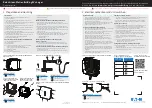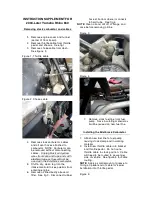
On board diagnostics (OBD-II)
Your vehicle is equipped with a computer that monitors the engine’s
emission control system. This system is commonly known as the On
Board Diagnostics System (OBD-II). This OBD-II system protects the
environment by ensuring that your vehicle continues to meet
government emission standards. The OBD-II system also assists the
service technician in properly servicing your vehicle. When the
Check
engine/Service engine soon
light illuminates, the OBD-II system has
detected a malfunction. Temporary malfunctions may cause your
Check
engine/Service engine soon
light to illuminate. Examples are:
1. The vehicle has run out of fuel. (The engine may misfire or run poorly.)
2. Poor fuel quality or water in the fuel.
3. The fuel cap may not have been securely tightened.
These temporary malfunctions can be corrected by filling the fuel tank
with good quality fuel and/or properly tightening the fuel cap. After three
driving cycles without these or any other temporary malfunctions
present, the
Check engine/Service engine soon
light should turn off. (A
driving cycle consists of a cold engine startup followed by mixed
city/highway driving.) No additional vehicle service is required.
If the
Check engine/Service engine soon
light remains on, have your
vehicle serviced at the first available opportunity.
Readiness for Inspection/Maintenance (I/M) testing
In some localities, it may be a legal requirement to pass an I/M test of
the on-board diagnostics system. If your
Check engine/Service engine
soon
light is on, refer to the description in the
Warning lights and
chimes
section of the
Instrument Cluster
chapter. Your vehicle may not
pass the I/M test with the
Check engine/Service engine soon
light on.
If the vehicle’s powertrain system or its battery has just been serviced, the
on-board diagnostics system is reset to a “not ready for I/M test” condition.
To ready the on-board diagnostics system for I/M testing, a minimum of 30
minutes of city and highway driving is necessary as described below:
•
First, at least 10 minutes of driving on an expressway or highway.
•
Next, at least 20 minutes driving in stop-and-go, city-type traffic with
at least four idle periods.
Allow the vehicle to sit for at least eight hours without starting the
engine. Then, start the engine and complete the above driving cycle. The
engine must warm up to its normal operating temperature. Once started,
do not turn off the engine until the above driving cycle is complete.
2004 F250/350/450/550
(f23)
Owners Guide (post-2002-fmt)
USA English
(fus)
Maintenance and Specifications
259
















































